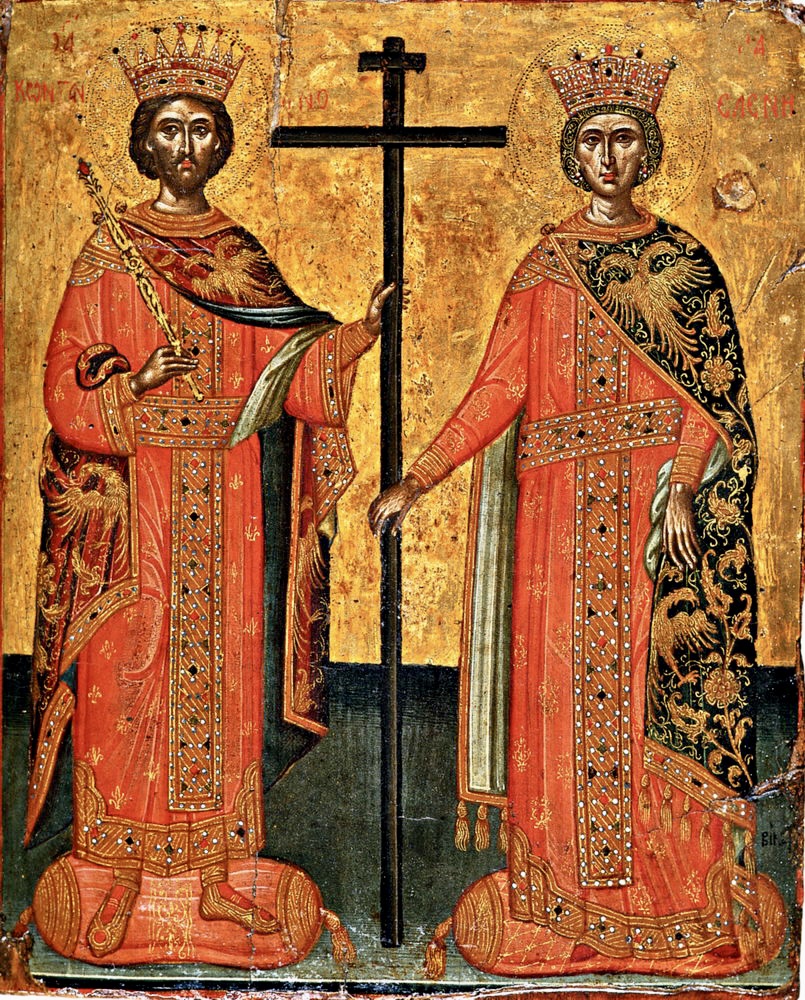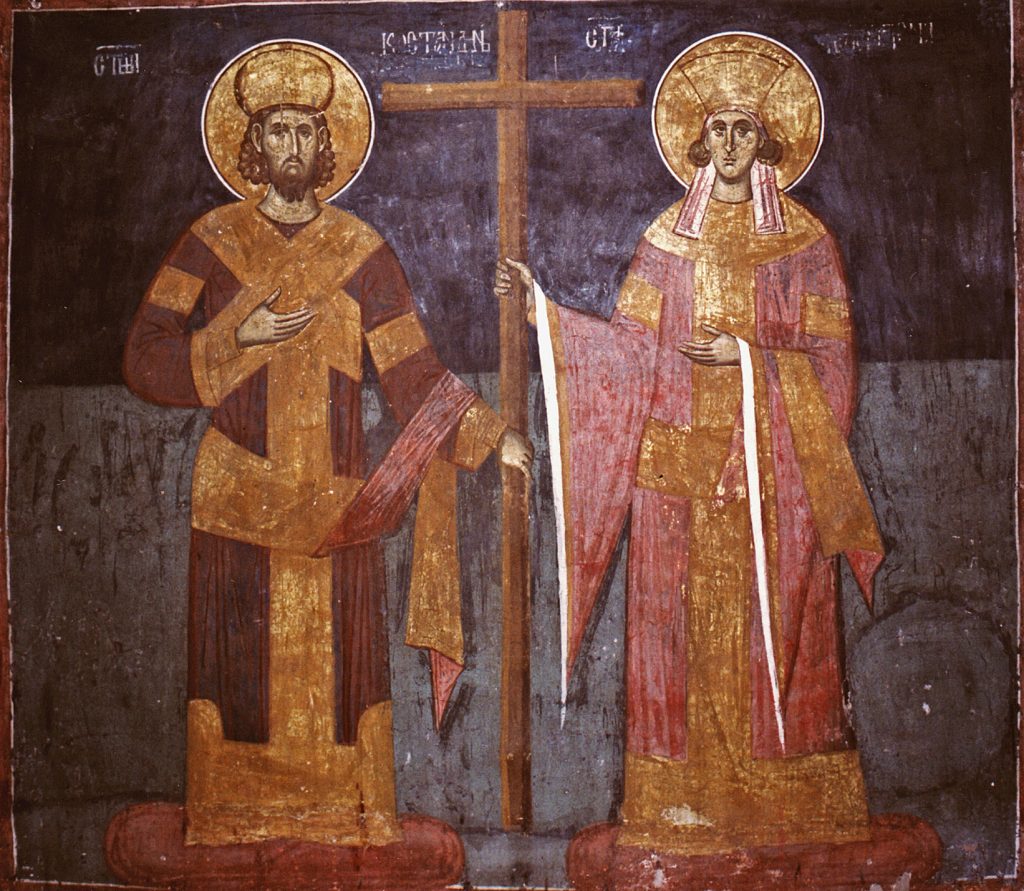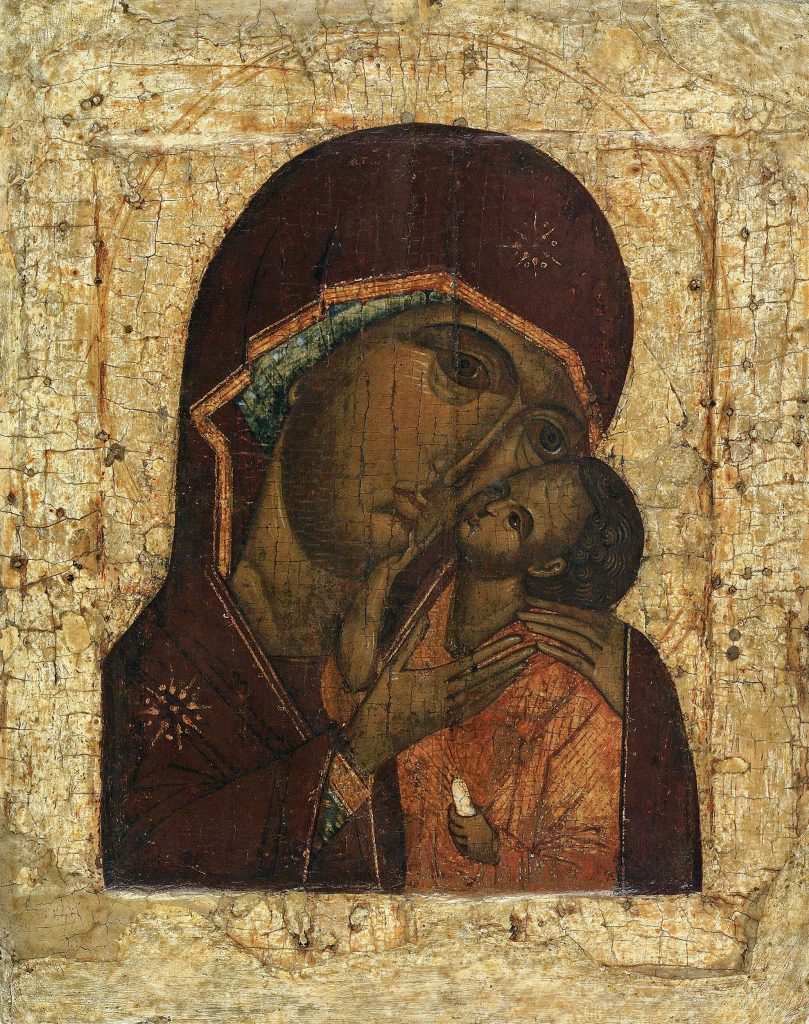A Supplicatory Canon to the Most Holy Theotokos
 Ode I, Irmos: I shall open my mouth, * and be filled with the Spirit, * and utter discourse to the Queen and Mother; * and be seen radiantly keeping festival, * joyfully praising her wonders.
Ode I, Irmos: I shall open my mouth, * and be filled with the Spirit, * and utter discourse to the Queen and Mother; * and be seen radiantly keeping festival, * joyfully praising her wonders.
Most Holy Theotokos, save us.
Thou alone art the help, refuge and preserver of thy servants, О pure Birthgiver of God. Wherefore, I fall down before thee and cry aloud: Save me, the accursed one, in that thou art merciful!
Most Holy Theotokos, save us.
Vile deeds have wounded my conscience, holding up my guilt before my face. О Lady, hasten thou and help me! Before the end, deliver me and save me!
Glory be to the Father, and to the Son, and to the Holy Spirit.
О Lady who hast given birth to the most holy Word and art more holy than all the hosts on high, О thou who alone art all-hymned, sanctify my defiled heart.
Now & ever, and unto the ages of ages. Amen.
In thee have I placed my hope of salvation, and to thee who art compassionate have I fled with faith. Disdain me not, О hope of the hopeless, neither show me to be a joy to the demons.
Ode III, Irmos: O Theotokos, thou living and plentiful fount, * establish in spiritual fellowship those who sing hymns to thee, * and in thy divine glory * grant them crowns of glory.
Most Holy Theotokos, save us.
О pure one, grant the dew of thy tender compassion unto me who am melting under the burning heat of sin, cooling me with light, in that thou art good, and imparting divine joy.
Most Holy Theotokos, save us.
Dispel the darkness of my mind with the Light which was within thee, О Theotokos, I pray, that thou mayest render me steadfast through examples of repentance, in that thou art compassionate and greatly merciful; that, saved I may call thee blessed.
Glory be to the Father, and to the Son, and to the Holy Spirit.
With the sprinkling of thy mercy, О divinely joyous Virgin, extinguish the burning embers of my passions, and light the burning lamp of my heart, О all-immaculate golden lamp-stand.
Now & ever, and unto the ages of ages. Amen.
The billows of sin and the tempest of mine unseemly thoughts engulf me; yet take pity on me, О all-immaculate one, and stretch forth unto me thy helping hand, in that thou art merciful, that saved I may call thee blessed.
Ode IV, Irmos: The Most High, * will be from a Virgin, * the Prophet Habbakuk cried aloud: * Glory to Thy power, O Lord!
Most Holy Theotokos, save us.
О thou who art the most wondrous Mother of God, shine forth upon me beams of repentance and dispel the gloom of my wretched soul, driving away the wicked thoughts of my heart, О Virgin.
Most Holy Theotokos, save us.
With faith I pray thee, the purification of all, О blessed one, and I pray: Render the Judge, thy Son, merciful unto me, that I may glorify thee with praises.
Glory be to the Father, and to the Son, and to the Holy Spirit.
О only pure one, in that thou art a physician, heal thou my lowly heart which hath become leprous through exposure to unclean passions, and rescue me from the hands of the demons.
Now & ever, and unto the ages of ages. Amen.
Of old, bolding forth most manifestly, the blessed Habbakuk described thee with divinely inspired words as the pure and overshadowed mountain of Him Who came forth from Thaeman and assumed flesh through thee, О Lady.
Ode V, Irmos: All creation stands in awe of thy divine glory; * for thou, O Virgin who hast not known wedlock, * didst contain within thy womb the God of all, * and gave birth to the timeless Son, * bestowing peace, upon all who hymn thee.
Most Holy Theotokos, save us.
Slain by passions and evil thoughts, О all-immaculate Lady, I flee to thy compassions and hasten to thy fervent protection and aid. O thou who alone hast given birth to Life, enliven my heart.
Most Holy Theotokos, save us.
With thine active healing cure me who have been bitten deep by the sword of sin, О pure one, for thou hast given birth to the Lord Who for my sake was pierced by a spear and thereby wounded the heart of the serpent.
Glory be to the Father, and to the Son, and to the Holy Spirit.
Treat thou my broken heart, О most immaculate one, heal the sufferings of my soul, and dispel the darkness of despondency, that in praises I may hymn thee, the ever-blessed one, О all-hymned Theotokos.
Now & ever, and unto the ages of ages. Amen.
Beholding the Grapes of the vine Whom she had produced, hanging upon the Tree, the Virgin cried aloud: “O my Child, thou pourest forth the sweet new-wine, doing away with the drunkenness of the foes who have crucified Thee in vain, for Thou art long-suffering in all things!”
Ode VI, Irmos: Celebrating the divine and solemn feast * of the Mother of God * O ye divinely wise, * let us come, clapping our hands, * and glorify God who was born of her.
Most Holy Theotokos, save us.
О thou who alone art the help of all, help us who are in tribulation, grant us thy hand, and steer us to the haven of salvation, О thou who alone art full of the grace of God.
Most Holy Theotokos, save us.
О most pure one, in the dread hour rescue me from the torture and delusion of the evil demons, from condemnation, fire, darkness and torment.
Glory be to the Father, and to the Son, and to the Holy Spirit.
I hymn thee, О all-hymned one, glorify thine honoured and mighty works. Do thou free me from, impure passions and grant unto me everlasting glory.
Now & ever, and unto the ages of ages. Amen.
We must needs be sing of thee, yet are truly unable to do so as is meet; wherefore, we quietly hymn thee, О Virgin, honouring in silence the ineffable mystery wrought within thee.
Lord, have mercy. Lord, have mercy. Lord, have mercy.
Glory be to the Father, and to the Son, and to the Holy Spirit; now & ever, and unto the ages of ages. Amen.
Sessional Hymn, Tone IV: Upon beholding Thee suspended upon the Cross, * O Word of God, * Thy most pure Mother exclaimed, lamenting maternally: * “What is this new and strange wonder, O my Son? * How is it that Thou, the Life of all, hast tasted death, * desiring to bring life to mortals, ** in so far as Thou art compassionate?”
Ode VII, Irmos: Refusing to worship created things * in place of the Creator, * The divinely wise youths bravely trampled down the threatening fire * and rejoicing they sang aloud: * O supremely hymned Lord and God of our Fathers, Blessed art Thou.
Most Holy Theotokos, save us.
О pure one, who alone art full of the grace of God, pray thou to the Immutable One to Whom thou hast given birth, that with His right hand He change my mind towards the good, for it hath been grievously altered by the temptations of the demons.
Most Holy Theotokos, save us.
О Virgin Queen who hast given birth to Christ the King, have pity and save me who have been brought low by the passions. Establish me with faith and. guide me to the path of salvation, О salvation of the faithful.
Glory be to the Father, and to the Son, and to the Holy Spirit.
О most immaculate one, be thou mine advocate before Him Who was born from thee; grant me remission of my cruel debts and divine entry into the kingdom of God, that I may receive its food and partake of its light.
Now & ever, and unto the ages of ages. Amen.
О all-immaculate Mary, pure Virgin who knewest not wedlock, who art infinite in goodness, having given birth to God in the flesh: Beseech Him, that He deliver us from all grief and sin.
Ode VIII, Irmos: The Offspring of the Theotokos * saved the holy children in the furnace. * He who was then prefigured hath now been born on earth, * and He gathereth all creation to hymn thee: * all ye works praise ye the Lord * and supremely exalt Him throughout all ages.
Most Holy Theotokos, save us.
Having prodigally squandered my life and committed every vile deed, I tremble before the judgment, before the trial, before the sentence which will be pronounced. Have mercy upon mine accursed soul, О pure one, and, before I die, grant me illumination.
Most Holy Theotokos, save us.
On thee have I set all my hope of salvation, O Mother of God who tasted not of wedlock, and ever call upon thee for help: Save me from grief, from the assaults of the enemy; loose thou the bonds of mine evils, and rescue me from everlasting darkness.
Glory be to the Father, and to the Son, and to the Holy Spirit.
Thou hast been revealed to be more exalted than the angels, having ineffably given flesh unto God. Him do thou therefore beseech, О all-immaculate Lady, that I may transcend carnal temptations and be delivered from the coming judgment and everlasting torment, О Virgin.
Now & ever, and unto the ages of ages. Amen.
Fill me with divine waters, О Virgin who didst bear the Wellspring in thy womb. Deliver me from the burning heat of my sins, guide me to the life of salvation, and dispel despondency from my wretched soul, О pure Virgin, and deliver me from the demons.
Ode IX, Irmos: Let every mortal born on earth, * radiant with light, in spirit leap for joy; * and let the host of the angelic powers * celebrate and honour the holy feast of the Mother of God, * and let them cry aloud: * Rejoice! O all- blessed Theotokos, * thou pure Ever-Virgin.
Most Holy Theotokos, save us.
With the power of thy prayer, О all-immaculate, divinely joyous and most pure Lady, mow down the meadow of my sins, granting me saving healing – the most pure fear of the Master.
Glory be to the Father, and to the Son, and to the Holy Spirit.
Thou art mine enlightenment, thou art my deliverance and joy, thou art mine ally, thou art my glory, my boast, hope and my salvation, and I cry unto thee: Save me, thy wretched servant, and rescue me from the gates of Hades.
Most Holy Theotokos, save us.
Save me, О pure one who hast given birth to the most compassionate Saviour, and take pity on thy servant; guide me to the path of repentance, dispel from within me the temptations of the evil one, deliver me from his pursuit, and rescue me from everlasting fire, О most immaculate one.
Now & ever, and unto the ages of ages. Amen.
The Word, Who from the beginning was incorporeal, abased Himself, clothing Himself in flesh from thee and dwelt incarnate in the world, О most immaculate one; and with divine power He hath cast down him who from of old hath tormented all.


